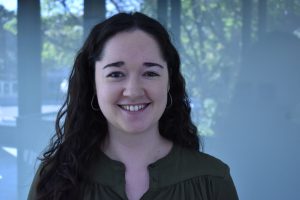Fifth Years
 Finola Kane-Grade
Finola Kane-Grade
Finola is a National Science Foundation Graduate Research Fellow and Ph.D. student on the Developmental Psychopathology and Clinical Science track at the Institute of Child Development (ICD). She is interested in neurobiological mechanisms linking early life stress and later psychopathology and health outcomes. Additionally, she hopes to identify protective mechanisms underlying resilience (such as social buffering) and translate this knowledge in ways that can be used to inform prevention efforts. At the University of Minnesota, she works with Dr. Megan Gunnar, Dr. Kathleen Thomas, and Dr. Bonnie Klimes-Dougan. Finola received her B.A. in Psychology and Music Performance from the University of Wisconsin-Madison in 2016 and completed an honors thesis on stress and learning with Dr. Seth Pollak. She then completed a postgraduate research fellowship at the Yale Child Study with Dr. Katarzyna Chawarska studying early markers of autism risk, and most recently worked as a research coordinator at Boston Children’s Hospital/Harvard Medical School with Drs. Charles Nelson and Michelle Bosquet Enlow studying emotional development and risk markers for childhood anxiety.
 Sally Stoyell
Sally Stoyell
Sally is a National Science Foundation Graduate Research Fellow and Ph.D. student in Developmental Psychology at the University of Minnesota’s Institute of Child Development. She is interested in studying the structural and physiological processes behind infant memory and cognitive development in both typically and atypically developing populations. Prior to joining the CDN Lab, Sally received her BS from Cornell University where she did her undergraduate thesis in a lab looking at EEG and behavioral measures of infant memory as related to iron status. Most recently she worked at Massachusetts General Hospital in the Chu Lab studying the brain processes and structure behind seizures and cognitive dysfunction in infantile and childhood epilepsies.
Fourth Years
 Maddie Fung
Maddie Fung
Maddie is a Ph.D. student in the Developmental Psychology program at the Institute of Child Development, working with Drs. Kathleen Thomas and Megan Gunnar. She is interested in studying the influence of puberty and stress hormones on structural and functional brain development, and using both neurobiological and neuroimaging methods to explore these changes during adolescence. Currently, she is involved in the MRI Study of Stress and Social Support. Maddie received her B.S. in Biology from Creighton University in 2019 and completed a postgraduate research fellowship with Dr. Tony Wilson at the Institute for Human Neuroscience, studying neurophysiological development using magnetoencephalography (MEG).
Third Years
 Lydia Lewis
Lydia Lewis
Lydia is a second year PhD student in the Developmental Science track at ICD. She received a B.S. in Neuroscience and a minor in Chemistry from the University of Pittsburgh in 2018, where she studied white matter development in first-episode psychosis and typically-developing youth. She then worked as a research technologist at the Center for Neuroimaging of Aging and Neurodegenerative Disease at the Martinos Center in Boston, MA before joining ICD. Her current research interests include neurodevelopmental trajectories in adolescence, sleep health, and environmental adversity.
Second Years
 emily furtado
emily furtado
Emily J. Furtado is a second-year PhD student in the Developmental Psychopathology and Clinical Science program. Through her research she would like to characterize how negative life experiences during sensitive developmental periods affect emotional functioning. Toward that goal, she hopes to use skills in neuroimaging (fMRI and fNIRS) to better understand how stress can influence emotion-related psychophysiology and risk for psychopathology Emily is currently supporting the CDN Lab’s efforts with the Minnesota Longitudinal Study of Risk and Adaptation.
Current Undergraduate Research Assistants
Alex Arndt
Mia DeCaluwe
Liz Kelly-Doan
Mary Ellingson
Jenny Jacobs
Marissa Jaszewski
Jordyn Kvasnicka
Riley Leonard
Samanvita Mangalampalli
Abby Maslow
Katrina Milbrandt
Lexy Miles
Olivia Ost
Ryan Sokol
Olivia Stangler
Emma Wahyu
Adam Wolf
Zhuyue Zhu

